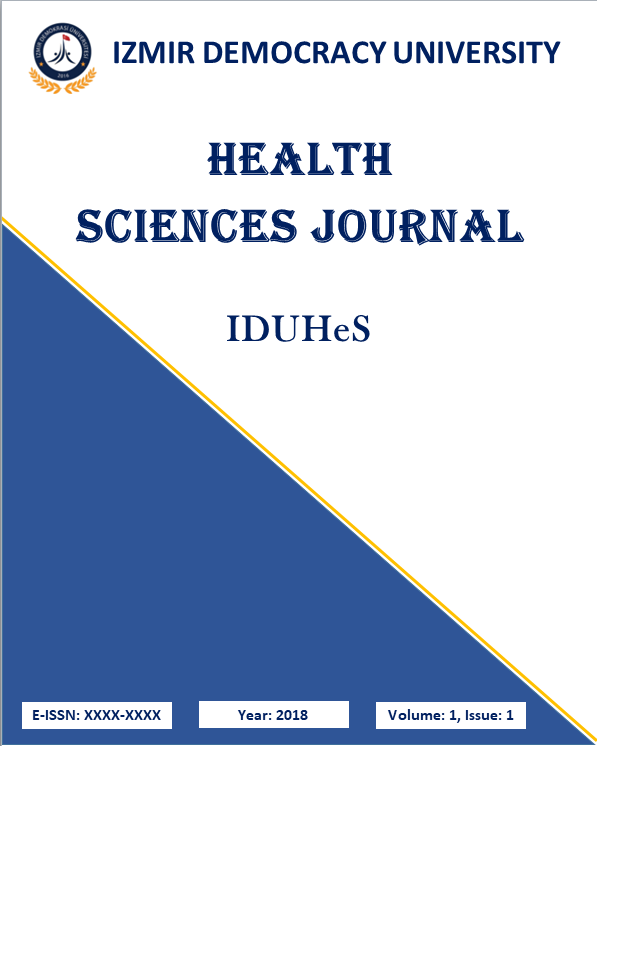SİMÜLASYONA DAYALI ÖĞRENMEDE “ÇÖZÜMLEME DENEYİM ÖLÇEĞİ”NİN TÜRKÇE VERSİYONUNUN GEÇERLİK GÜVENİRLİĞİ
Simülasyon, Hemşirelik eğitimi, Çözümleme, Çözümleme deneyim ölçeği, Hasta simülasyonu
VALIDITY AND RELIABILITY OF THE TURKISH VERSION OF “DEBRIEFING EXPERIENCE SCALE” IN SIMULATION-BASED LEARNING
Simulation, Nursing education, Debriefing, Debriefing experience scale, Patient simulation.,
___
- Alderman, J. (2012). Using simulation to teach nursing students and licensed clinicians obstetric emergencies. The American Journal of Maternal/Child Nursing, 37(6), 394-400. https://doi.org/ 10.1097/NMC.0b013e318264bbe7.
- Ayre, C., & Scally, A. J. (2014). Critical Values for Lawshe’s Content Validity Ratio: Revisiting the Original Methods of Calculation. Measurement & Evaluation in Counseling & Development, 47(1), 79-86. https://doi.org/10.1177/0748175613513808.
- Burns, N., & Groves, K. (2003). Practice of nursing research (3th edition ed.): WB. Saunders Company, USA.
- Büyüköztürk, Ş. (2007). Statistics, Research Design, Spss Applications and Interpretation. In Data Analysis Handbook for Sciences. (pp. 100-350). Ankara: Pegem Academy Publishing.
- Cantrell, M. A. (2008). The importance of debriefing in clinical simulations. Clinical Simulation in Nursing, 4(2), e19-e23. https://doi.org/10.1016/j.ecns.2008.06.006.
- Chronister, C., & Brown, D. (2012). Comparison of simulation debriefing methods. Clinical Simulation in Nursing, 8(7), e281-e288. https://doi.org/10.1016/j.ecns.2010.12.005.
- Çokluk, Ö., Şekercioğlu, G., & Büyüköztürk, Ş. (2012). Multivariate Statistics for Social Sciences: SPSS and Lisrel Applications. (2nd edt ed.). Ankara: Pegem Academy Publishing.
- Decker, S., Sportsman, S., Puetz, L., & Billings, L. (2008). The evolution of simulation and its contribution to competency. The Journal of Continuing Education in Nursing, 39(2), 74-80. https://doi.org/10.3928/00220124-20080201-06.
- dos Santos Almeida, R., Mazzo, A., Amado Martins, J. C., Dias Coutinho, V. R., Jorge, B. M., & Costa Mendes, I. A. (2016). Validation to Portuguese of the Debriefing Experience Scale. Revista brasileira de enfermagem, 69(4), 658-664. https://doi.org/10.1590/0034-7167.2016690413i
- Dreifuerst, K. T. (2012). Using debriefing for meaningful learning to foster development of clinical reasoning in simulation. Journal of Nursing Education, 51(6), 326-333. https://doi.org/10.3928/01484834-20120409-02.
- Eppich, W., & Cheng, A. (2015). Promoting excellence and reflective learning in simulation (PEARLS): development and rationale for a blended approach to health care simulation debriefing. Simulation in Healthcare, 10(2), 106-115. https://doi.org/10.1097/SIH.0000000000000072.
- Esin, M. N. (2014). Data Collection Methods and Tools & Reliability and Validity of Data Collection Tools. In S. Erdoğan, N. Nahcivan, & M. N. Esin (Eds.), Nursing Research. İstanbul: Nobel Medical Bookstores.
- Harder, B. N. (2009). Evolution of simulation use in health care education. Clinical Simulation in Nursing, 5(5), 169-172. https://doi.org/10.1016/j.ecns.2009.04.092.
- Harrington, D. (2009). Confirmatory Factor Analysis. New York: Oxford University Press.
- INACSL Standards Committee. (2016). INACSL Standards of Best Practice: Simulation SM Simulation Glossary. Clinical Simulation in Nursing, 12, 39-47. http://dx.doi.org/10.1016/j.ecns.2016.09.012.
- Karagöz, Y. (2014). SPSS 21.1 Applied Biostatistics. Ankra: Nobel Academic Publishing.
- Oudshoorn, A., & Sinclair, B. (2015). Using unfolding simulations to teach mental health concepts in undergraduate nursing education. Clinical Simulation in Nursing, 11(9), 396-401. https://doi.org/10.1016/j.ecns.2015.05.011.
- Reed, S. J. (2012). Debriefing experience scale: Development of a tool to evaluate the student learning experience in debriefing. Clinical Simulation in Nursing, 8(6), e211-e217. https://doi.org/10.1016/j.ecns.2011.11.002
- Rudolph, J. W., Simon, R., Dufresne, R. L., & Raemer, D. B. (2006). There's no such thing as “nonjudgmental” debriefing: a theory and method for debriefing with good judgment. Simulation in Healthcare, 1(1), 49-55.
- Sanner-Stiehr, E. (2017). Using simulation to teach responses to lateral violence: guidelines for nurse educators. Nurse Educator, 42(3), 133-137. https://doi.org/10.1097/NNE.0000000000000326.
- Sönmez, V. (2005). Mistakes in scientific research. Eurasian Journal of Educational Research (EJER)(18), 150-173.
- Şencan, H. (2005). Sosyal ve Davranışsal Ölçümlerde Güvenilirlik ve Geçerlik. Ankara: Seçkin Yayıncılık.
- Tezbaşaran, A. A. (2008). Likert Type Scale Preparation Guide: Online Book.
- Tosterud, R., Wangensteen, S., Petzäll, K., & Hall-Lord, M. L. (2015). Cross-cultural validation and psychometric testing of the questionnaire: Debriefing experience scale. Clinical Simulation in Nursing, 11(1), 27-34. https://doi.org/10.1016/j.ecns.2014.09.011.
- Ulrich, B., & Mancini, B. (2014). Mastering Simulation. A Handbook for Success. Sigma Theta Tau International, Indianapolis Yurdugül, H. (2005). Using scope validity indices for scope validity in scale development studies. XIV. Ulusal Eğitim Bilimleri Kongresi, 1, 771-774.
- Yayın Aralığı: Yılda 3 Sayı
- Başlangıç: 2018
- Yayıncı: İzmir Demokrasi Üniversitesi
Sevgim KÜÇÜK, Nurdan AKÇAY DİDİŞEN
İNSANLARDAKİ COVID-19 YABAN HAYVANLARINDA RİSK OLUŞTURUYOR MU?
Basak HANEDAN, Ali BİLGİLİ, Nigar ABBASOVA
Gökmen YAPALI, Serdar ARSLAN, Cihan Caner AKSOY, Neslihan Altuntas YILMAZ
HEMŞİRELİK EĞİTİMİNDE EĞİTİM PROGRAMI DEĞERLENDİRME ÇALIŞMALARI: SİSTEMATİK DERLEME
Gülsüm ÇONOĞLU, Fatma ORGUN, Nilay ÖZKÜTÜK
COVID-19 PANDEMİSİNDE ÇOCUK CERRAHİSİ KLİNİĞİNDE YATAN ÇOCUĞUN EBEVEYNİ OLMAK; NİTEL ÇALIŞMA
Derya SULUHAN, Nurdan AKCAY, Dilek YILDIZ, Ayşe İSLAMOĞLU
KÖPEKLERDE DÜŞÜK YOĞUNLUKLU LAZER TEDAVİSİNİN ETKİNLİĞİ
Nurten TERKEŞ, Sedanur İLTER, Ezgi ZORLU
ÜNİVERSİTE ÖĞRENCİLERİNDE AKDENİZ DİYETİNE UYUM DÜZEYİ İLE UYKU KALİTESİ ARASINDAKİ İLİŞKİ
Azra BALKANLI, Kezban Esen KARACA, Merve SAVICI
HEMŞİRELİK ÖĞRENCİLERİNİN DİYABET RİSKLERİNİN BELİRLENMESİ
Esin SEVGİ DOĞAN, Cansu KOŞAR ŞAHİN, Dilan DENİZ AKAN, Sezgi ÇINAR PAKYÜZ, Kübra IŞIK, Kader MINGIR
60 YAŞ VE ÜSTÜ BİREYLERDE KORONAVİRÜS (COVID-19) FARKINDALIĞI VE İLİŞKİLİ FAKTÖRLERİN İNCELENMESİ
